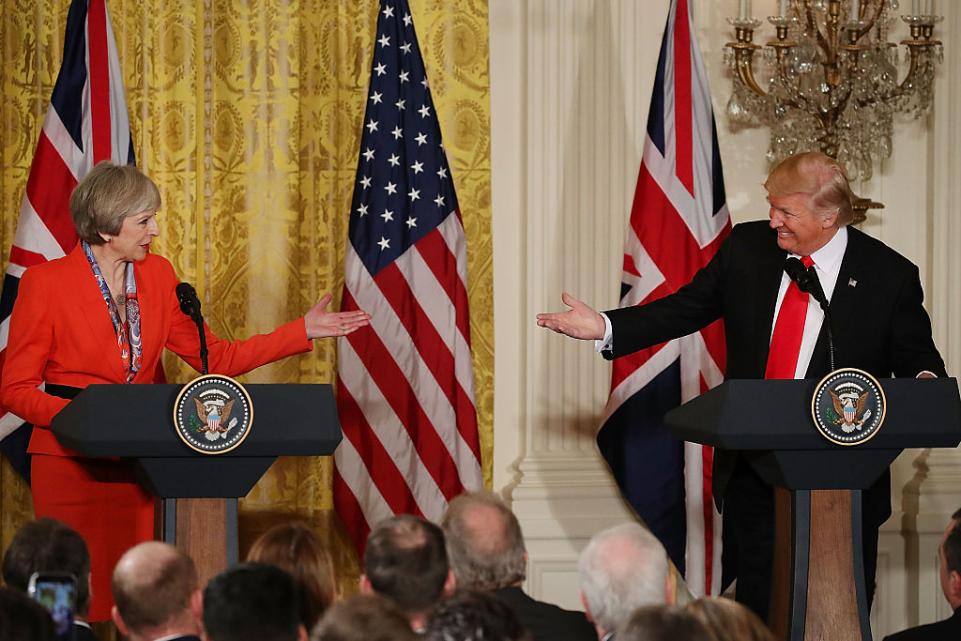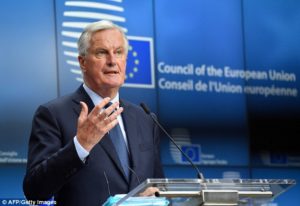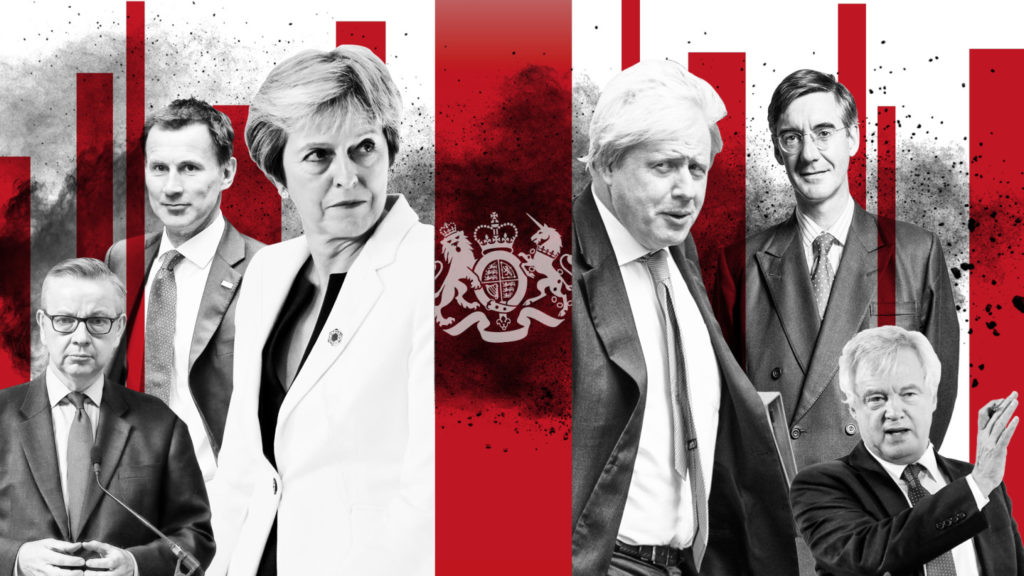Or, as Britain’s most notorious politician, Boris Johnson, warns, ‘volunteering for economic vassalage’?
Here is the Trumpian way President Donald Trump thanked Prime Minister Theresa May for orchestrating his recent cloak-and-dagger visit to the UK:
Mr. Trump second-guessed Mrs. May’s handling of the main issue on her plate: how Britain should cut ties to the European Union [a.k.a. Brexit]. He cast doubt on whether he was willing to negotiate a new trade deal between Britain and the United States, and praised Mrs. May’s Conservative Party rival, Boris Johnson, as a potentially great prime minister.
(The New York Times, July 12, 2018)
Trump has shown time and again that the organizing principle of his presidency is opposing everything Obama supported. Therefore, it’s noteworthy that he’s casting doubt on a post-Brexit trade deal just as Obama did.
Not to mention that Trump’s doubt is a far cry from the assurance he provided when May rushed to be the first foreign leader to visit the White House after his inauguration:
‘I think Brexit is going to be a wonderful thing for your country,’ Mr. Trump said. He said the U.K. will be able to reach ‘free trade deals without somebody watching you and what you are doing.’
(The Wall Street Journal, January 27, 2017)
Except that chaos, confusion, and contradictions have become defining features of Trump’s presidency. And the roving confluence of his imperial arrogance and juvenile temper only compound those features. He betrayed this when he publicly whined about May failing to heed his advice to sue the EU instead of negotiating a Brexit deal; this, from the purported master of The Art of the Deal …
But the way Trump dissed May in the UK was unprecedented. It was especially egregious given that she was in the midst of a mutiny in her cabinet. After all, several high-profile ministers, including foreign secretary Boris Johnson, had just resigned in protest over her handling of the negotiations.
Incidentally, it speaks volumes about Trump’s popularity abroad that the secret service had to take as many precautions for his visit to the UK, America’s closest ally, as it took for his predecessor’s visits to wartime Iraq and Afghanistan.
I know, this commentary is supposed to be about May and the Brexit negotiations. It’s just that the pandemic nature of Trump’s presidency is such that I had to begin with how he has infected them.
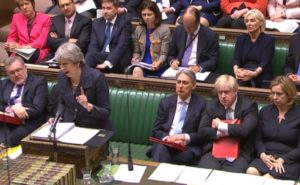 That said, here is my take on May and those negotiations.
That said, here is my take on May and those negotiations.
Mrs May is hoping the White Paper – which sparked two cabinet resignations – will allow the two sides to reach a deal on post-Brexit relations by the autumn, so the UK can avoid leaving the EU without a deal in March next year.
The White Paper proposes close ties in some areas, such as the trade in goods, but Mrs May says it will end free movement and the jurisdiction of the European Court, and allow the UK to strike trade deals with other nations.
(BBC July 20, 2018)
In fact, her White Paper is just a formal version of the idea May floated earlier this year for a “managed divergence” from EU rules. But it should have been instructive that, according to the March 8 edition of The Economist, the EU dismissed it back then as cherry-picking that would undermine the single market.
To be fair, though, in proposing her managed divergence, May was just doing what her predecessors did. Here, for example, is how I condemned former Prime Minister Gordon Brown for the way he was cherry-picking EU rules over a decade ago:
Nothing justifies my ‘eurocynicism’ quite like British Prime Minister Gordon Brown’s Sisyphean attempts to reconcile the contradictions inherent in this treaty. Because, according to the BBC, he proffered in recent parliamentary debates – without any hint of irony – that he had
‘…secured special treatment for the UK in a range of areas at the European summit and that Britain would keep opt-outs on foreign policy, labour rights, tax and social security.’
But, if Britain has already established the untenable precedent that it can ‘opt-out’ of key provisions of the treaty, what is the legal and substantive effect of this ersatz constitution?!
(“A Dead EU Constitution Resurrected as a ‘New Treaty’ Is Still a Dead EU Constitution!” The iPINIONS Journal, November 13, 2007)
Of course, the prime ministerial chutzpah in this case is that May is not looking for opt-outs while remaining in the EU; she is looking for opt-ins while leaving it.
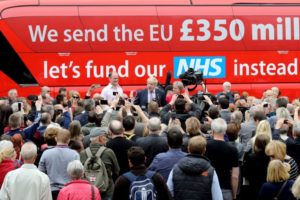 In any event, her “soft-Brexit” strategy smacks of the kind dithering and ambivalence hard Brexiteers (a.k.a. Eurosceptics) find unworkable and humiliating in equal measure. They prefer a clean and comprehensive break from the EU. Here in part is how their pied piper, the aforementioned Johnson, denounced the “fog of uncertainty” May is proposing:
In any event, her “soft-Brexit” strategy smacks of the kind dithering and ambivalence hard Brexiteers (a.k.a. Eurosceptics) find unworkable and humiliating in equal measure. They prefer a clean and comprehensive break from the EU. Here in part is how their pied piper, the aforementioned Johnson, denounced the “fog of uncertainty” May is proposing:
He listed a series of compromises … including the £40bn payment agreed as part of the withdrawal agreement, the continued oversight of the European court of justice over some issues, and the ‘common rulebook’ for key industries.
‘Far from making laws in Westminster, there are large sectors in which ministers will have no power to initiate, innovate, or even deviate,’ he said, describing [May’s] approach as ‘volunteering for economic vassalage’.
(The Guardian, July 18, 2018)
But Brexiteers are not the only ones pooh-poohing May’s “Chequers” plan. European bureaucrats are giving them a run for their money. This was manifestly the case here:
‘We read the white paper and we read ‘cake’,’ an EU official told the Guardian, a reference to Boris Johnson’s one-liner of being ‘pro having [cake] and pro-eating it.’
(The Guardian, July 2, 2018)
Just hours after the PM pleaded for the EU to drop its ‘unworkable’ Irish border demands, [EU chief negotiator Michel Barnier] complained that her Chequers blueprint – which would see the UK collect some tariffs for Brussels and follow a ‘common rule book’ on goods – undermined the single market and would cause ‘unjustifiable’ bureaucracy.
In a withering assessment that will ramp up fears of ‘no deal’ Brexit, Mr Barnier questioned whether the UK could be trusted … jibing that the ‘intense’ debate in the UK was ‘not over’.
(The Daily Mail, July 20, 2018)
Indeed, as if negotiating this aspect of Brexit were not troubling enough, May is facing the clear and present danger of Republicans and Loyalists reigniting “The Troubles” that beset Northern Ireland from 1968 to 1998.
The dissidents intend to exploit [the Irish border issue] to the full.
To the [IRA] dissidents, PIRA and Sinn Féin are traitors who have betrayed the cause of uniting Ireland through ‘armed struggle’, by becoming constitutionalists and entering a devolved, partitionist government at Stormont.
(BBC, May 2018)
But I digress …
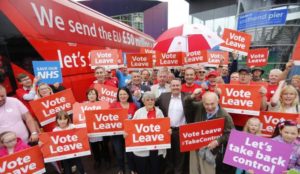 As my November 2007 quote indicates, I’ve been decrying Britain’s ill-fated efforts to negotiate one-foot-in/one-foot-out deals with the EU for years. Therefore, I see no point in delving too deep into Brexit’s murky waters here.
As my November 2007 quote indicates, I’ve been decrying Britain’s ill-fated efforts to negotiate one-foot-in/one-foot-out deals with the EU for years. Therefore, I see no point in delving too deep into Brexit’s murky waters here.
Frankly, it should suffice to know that at least half of the Britons who voted for Brexit can’t even name the EU’s four “indivisible” freedoms, namely the free movement of goods, capital, services, and people. This, despite the fact that Britain’s attempt to divvy up these freedoms (e.g., by cherry picking to allow goods but restrict people) has been the most animating feature of the Brexit debate.
More to the point, this prevailing ignorance is why so many Britons, across the political spectrum, have been calling for a second referendum (a.k.a. a mulligan) before any UK-EU divorce settlement is executed.
Cue the second coming of former Prime Minister Tony Blair.
Blair has said there must be a second referendum on the terms of the UK’s future relationship with the European Union, once those terms are known. …
Mr Blair also said Brexit would reduce the UK’s global standing and influence, and also put at risk the lasting peace in Northern Ireland, which has been maintained by the Good Friday Agreement which was brokered in 1998, in the early days of his Premiership.
(The Independent, October 23, 2017)
Meanwhile, EU leaders are clearly even more loath to grant May her opt-ins than they were to grant her predecessors (Brown and Cameron) their opt-outs. This is why Britain’s exit from the EU is fated to end with a “no-deal Brexit.” Put another way, Britain might get a deal, but it will look more like a plea bargain than the get-out-of-EU-free card to which so many Britons clearly feel entitled.
Again, I warned time and again that it would be thus, including in such commentaries as “Brexit: Britain Exits, the Die Is Cast,” June 24, 2016, “Brexit: Forget Leaving, Britain a Greater EU Contagion If It Remains,” June 22, 2016, and “EU: Britain Trying to Have Its Cake and Eat It Too,” January 29, 2013.
This last commentary predates Brexit; but it highlights the rational fear that is causing EU leaders to impose onerous terms on the UK for any Brexit deal. They reasonably fear that any concession to Britain could trigger a domino effect – with other members seeking similar Brexit deals.
Here is an instructive excerpt from that commentary.
____________________
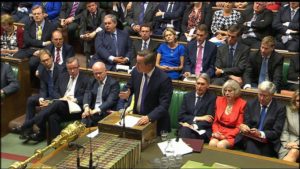 [Prime Minister] Cameron stands even less chance of negotiating a new settlement with his European partners than President Assad stands of negotiating a peace settlement with Syrian opposition forces. Nothing affirms this quite like virtually all of Cameron’s European partners reacting to his pledge [to negotiate opt-out concessions] by giving him the proverbial finger. …
[Prime Minister] Cameron stands even less chance of negotiating a new settlement with his European partners than President Assad stands of negotiating a peace settlement with Syrian opposition forces. Nothing affirms this quite like virtually all of Cameron’s European partners reacting to his pledge [to negotiate opt-out concessions] by giving him the proverbial finger. …
There’s no gainsaying that the UK needs the EU far more than the EU needs the UK. Many feared, for example, that the euro currency would fold if the UK did not adopt it. But the euro has thrived in spite of this. …
In fairness to Cameron, though, he is only trying to cherry-pick EU policies the way almost all British prime ministers have done – not as much to advance Britain’s national interests as to pander to rabid factions within their respective political parties. …
Except that there clearly would be no Europe if each member state were allowed to bend the rules (i.e., to opt out of any policy or claw back any power it deems would serve its national interest). Which is why, instead of allowing Britain to undermine its core features by continually trying to do so, the EU should enact a policy to kick out any member that seeks such ‘special treatment.’
____________________
Mind you, I readily acknowledge that there will be no winners when Brexit takes effect in Spring 2019. All the same, that “this sceptered isle” finds itself so isolated and in such a weak bargaining position seems tragic.
Not to mention the spectacle of May having far greater difficulty managing the divergent demands of soft and hard Brexiteers within her own party than those of her European partners. It’s plainly impossible to reconcile the red lines on all sides.
This is why Britain is fated to end up an island unto itself … marooned in the global sea by the foolish, ignorant pride Brexit reflects. Even worse, as Obama famously warned (and Trump hinted), it will find itself at the back of the line of weak and relatively poor countries trying to strike trade deals with the world’s biggest trading blocs, including the American-led NAFTA, the Chinese-led ACFTA, and yes, ironically enough, the German-led EU.
Alas, that so many Britons seem oblivious to all this only makes May’s Brexit negotiations seem a complete farce.
Related commentaries:
Dead EU Constitution…
Brexit: Forget Leaving…
Britain trying to have cake…
